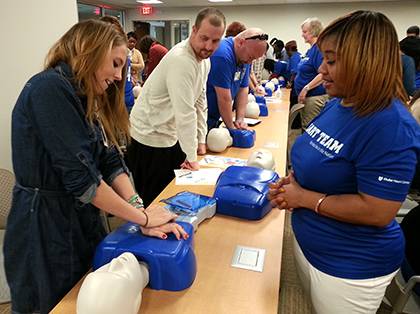Sign up for Free CPR Training
Duke Heart Center to hold compression-only CPR training for all employees March 27

Bernadette Gillis always had CPR training on her to-do list. When Duke Heart Center started offering Duke employees free opportunities to learn, Gillis, a senior public relations specialist in Duke Medicine’s Development and Alumni Affairs, found herself delivering forceful presses last December to the blue plastic chest of a manikin. She was one of 261 Duke employees who learned compression-only CPR, which is CPR without mouth-to-mouth resuscitation, when to dial 911, and how to use an automated external defibrillator (AED). The Duke Heart Center is offering another free training sessions on March 27, and Duke employees can sign up to participate in the hour-long class at the Duke Medicine Pavilion. “I might be able to help save someone’s life,” said Gillis, whose father died from a heart attack in 1999. “We can do our part, even though we’re not medically trained.”Delivering immediate CPR to someone experiencing sudden cardiac arrest can double to triple a sudden cardiac arrest victim’s chance of survival, according to the American Heart Association.During the free training, participants form teams and respond to different hypothetical situations painted on and off campus, as well as practice CPR steps on a manikin. Instructors will also discuss how to use the Heimlich maneuver to help someone who’s choking. Participants receive a free Burt’s Bees gift pack that contains three types of lip balm, as well as a wallet card outlining CPR steps and the chance to win door prizes. CPR guidelines were updated in 2010 to compression-only CPR because the simpler technique may help community responders overcome panic and hesitation to act. The Duke Heart Center follows these guidelines and began offering free training to large Duke groups in 2011, with a mission to train all Duke employees in CPR.
“We look at you as being an ambassador to Duke and to the communities that we serve,” said Leatrice Martin, director of the Duke Heart Center’s Community Outreach and Education Program. “This skill is simple and can be easily taught to others, which increases the chances of survival in someone who suffers cardiac arrest."
Read More